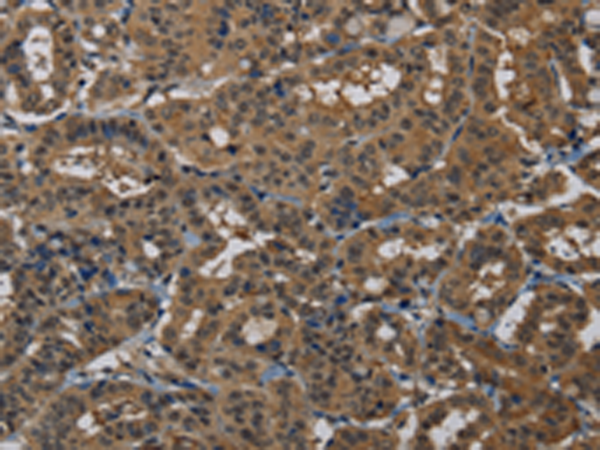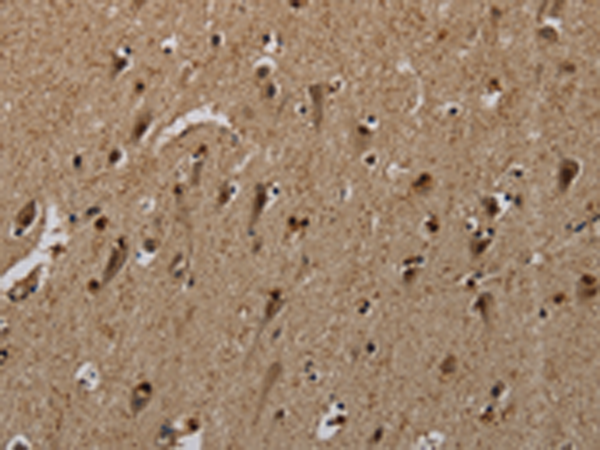

| WB | 咨询技术 | Human,Mouse,Rat |
| IF | 咨询技术 | Human,Mouse,Rat |
| IHC | 1/50-1/200 | Human,Mouse,Rat |
| ICC | 技术咨询 | Human,Mouse,Rat |
| FCM | 咨询技术 | Human,Mouse,Rat |
| Elisa | 1/2000-1/5000 | Human,Mouse,Rat |
| Aliases | DRS; DRSP; SDK3; memA |
| Host/Isotype | Rabbit IgG |
| Antibody Type | Primary antibody |
| Storage | Store at 4°C short term. Aliquot and store at -20°C long term. Avoid freeze/thaw cycles. |
| Species Reactivity | Human, Mouse |
| Immunogen | Synthetic peptide of human PNN |
| Formulation | Purified antibody in PBS with 0.05% sodium azide and 50% glycerol. |
+ +
以下是关于PNN(Perineuronal Nets)抗体的3-4条参考文献,涵盖其结构、功能及在疾病研究中的应用:
---
1. **文献名称**:*Perineuronal nets: Plasticity, protection, and therapeutic potential*
**作者**:Sorg BA, Berretta S, Blacktop JM, Fawcett JW, Kitagawa H, Kwok JCF, Miquel M
**摘要**:
该综述探讨了PNN的分子组成、在神经可塑性和神经保护中的作用,并总结了针对PNN的抗体在解析其功能及开发神经系统疾病(如阿尔茨海默病、癫痫)治疗策略中的应用。
2. **文献名称**:*Antibody-based analysis of perineuronal nets in schizophrenia*
**作者**:Mauney SA, Athanas KM, Pantazopoulos H, Shaskan N, Passeri E, Berretta S
**摘要**:
研究使用抗PNN核心蛋白(如聚集蛋白聚糖)的抗体,分析精神分裂症患者死后脑组织中PNN的密度和分布变化,提出PNN异常可能与突触功能障碍相关。
3. **文献名称**:*The role of perineuronal nets in the maintenance of long-term memory*
**作者**:Pizzorusso T, Medini P, Berardi N, Chierzi S, Fawcett JW, Maffei L
**摘要**:
通过抗PNN抗体标记,研究发现降解PNN会破坏记忆巩固,证明PNN在稳定突触连接和维持长期记忆中起关键作用,为治疗记忆障碍提供新思路。
4. **文献名称**:*Developmental changes in the structure and composition of perineuronal nets*
**作者**:Brückner G, Grosche J, Schmidt S, Härtig W, Margolis RU, Delpech B
**摘要**:
利用特异性抗体(如抗硫酸软骨素抗体)研究大鼠大脑PNN的发育变化,揭示其在神经回路成熟中的作用,并分析不同发育阶段PNN分子组成的动态变化。
---
以上文献聚焦于PNN的生物学功能及抗体在其研究中的应用,覆盖神经科学基础与疾病机制领域。如需具体文献来源(期刊、年份),可进一步补充关键词进行精准检索。
PNN antibodies, also known as anti-peripherin antibodies, are autoantibodies targeting peripherin, a type III intermediate filament protein expressed in neurons and neuroendocrine cells. First identified in the 1990s, these antibodies gained attention due to their association with paraneoplastic neurological syndromes (PNS) and autoimmune disorders affecting the nervous system. Peripherin plays a role in maintaining cytoskeletal integrity and axonal transport, particularly in peripheral nerves and retinal ganglion cells.
In autoimmune contexts, PNN antibodies are often linked to small-cell lung cancer (SCLC)-related paraneoplastic encephalomyelitis or sensory neuropathy. Their presence suggests an immune response triggered by tumor-expressed peripherin, leading to cross-reactivity with neuronal tissues—a phenomenon termed "molecular mimicry." Detection methods include immunohistochemistry and immunoblotting, though their diagnostic specificity remains debated due to overlapping reactivity with other intermediate filaments like neurofilaments.
Clinically, PNN antibodies serve as potential biomarkers for early cancer detection in neurological patients, though their pathogenic role in neuronal damage is not fully established. Research continues to explore their utility in differentiating autoimmune neuropathies and guiding oncological surveillance. Despite their rarity, PNN antibodies highlight the complex interplay between neoplasms, autoimmunity, and neurological dysfunction.
×